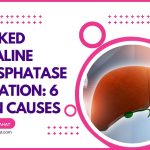Do gallstones cause urinary problems or affect kidney function?
Our content is not intended nor recommended as a substitute for medical advice by your doctor. Use for informational purposes only.
Uncomplicated gallstones don’t cause any urinary symptoms. Urinary symptoms occur only when gallstones obstruct the bile ducts leading to dark-colored urine and bilirubin nephropathy.
The following gallstone-associated condition may affect the kidneys and cause urinary symptoms:
- Overuse of analgesics for gallstones.
- Gallstones obstruct the bile ducts (obstructive jaundice).
- Delayed treatment of obstructive jaundice may cause a condition called (bilirubin nephropathy).
- Persistent vomiting or severe dehydration due to biliary colics or acute cholecystitis.
The most important facts and links between gallstones, urinary symptoms, and kidney function.
1. Uncomplicated gallstones don’t affect your kidneys or urine.
Gallstones are found inside the gallbladder connected to your digestive tract through a duct called (the common bile duct).
Gallstones are not linked to your kidney. And they don’t pass through urine.
The term uncomplicated gallstones refer to gallstones’ presence without any symptoms or with typical biliary colics.
While complicated gallstone disease refers to the presence of either:
- Common bile duct obstruction, or
- Acute cholecystitis or its complications such as sepsis or perforation.
MORE:
Complicated gallstones may affect your urine and kidney. But the simple, uncomplicated gallstones have nothing to do with your urine and kidneys.
The typical gallbladder symptoms (for both uncomplicated and complicated gallstone disease) are in the table below:
| Typical (uncomplicated) gallbladder pain | Complicated gallbladder pain | |
| 1. Site | Usually, The right upper quadrant of your abdomen | The same. |
| 2. Spread | – The pain may spread to the back of the right shoulder. – Also, it spreads to the epigastric area. | The same. |
| 3. Character | Constant. Builds up and then disappears gradually. | The same, but more severe and more prolonged. |
| 4. Duration | At least 30 minutes. It may last up to 6 hours. | It can last more than 6 hours. |
| 5. Relation to food | – Triggered by foods (especially fatty food and large meals. – However, it can start spontaneously. | Often persistent. Regardless of eating. |
| 6. Comes and goes? | Yes | No |
| 7. Nausea, vomiting. | Often Present. | Present, but very severe and persistent. |
| 8. Associated symptoms– Heartburn and chest pain. – Bloating, fullness. – Early satiety. – Epigastric pain. | The same, but more severe. | |
| 9. Fever. | Absent. | Often present. |
| 10. Jaundice | Absent | Present with Bile duct stones. |
| 11. Murphy’s sign (tenderness over the gallbladder area) | Often absent. | Often present. |
2. Gallstone and urine color.
As we mentioned before, uncomplicated gallstones (inside the gallbladder) don’t change the urine color.
However, gallstones may slip into the narrow canal connecting the gallbladder to the duodenum (the common bile duct). Some may pass into the duodenum, while others may get stuck inside the CBD and cause its obstruction.
The obstruction of the common bile duct will prevent bile secretion from the liver to the gut tract (the duodenum).
The obstruction of bile secretion from the liver will increase bilirubin levels in the blood, which results in:
- Darker color of your urine (tea-colored urine)
- Yellowish discoloration of the skin.
- Yellowish discoloration of your eye whites.
- Itching.
- Triggering of biliary pain (a more severe form of biliary colic).
- Infection of the biliary system (cholangitis).
Changes in urine color (tea or cola-colored urine) is the only urinary symptoms associated with complicated gallstones. Gallstones don’t lead to other urinary symptoms such as burning urine or increased urine frequency.
3. Gallstones and kidney function.
Gallstones can affect the kidney by one of three mechanisms.
A. Analgesic abuse for biliary colic is a common cause of kidney affection.
Gallstones itself doesn’t affect kidney function. However, people with recurrent biliary colics may abuse analgesics such as ibuprofen or ketorolac. Analgesic overdose may affect your kidneys.
Chronic analgesics (whether oral or injection) may affect your kidney function. Also, using a large dose of a Non-steroidal Anti-inflammatory medication such as ketorolac may result in acute kidney injury.
Be cautious with analgesics, and don’t overdose unless prescribed by your doctor. Painkillers are riskier in patients with chronic kidney diseases or diabetes and hypertension.
B. Bilirubin nephropathy (rare).
In people’s advanced stages of obstructive jaundice, the exceptionally high bilirubin levels in the blood may affect kidney function. Very high bilirubin levels (often > 20 or 30 mg/dl) may cause an acute rise in serum creatinine and a decrease in urine output.
Bilirubin or bile cast nephropathy takes several days or weeks to happen. Nowadays, it rarely happens due to advances in management.
Once the construction is diagnosed, your doctor will perform an urgent intervention to relieve the bile obstruction within hours to a few days.
So, bilirubin nephropathy (bile cast nephropathy) is now very rare and occurs only with failed treatment or in areas of the world that lack primary medical care.
C. Persistent vomiting and lack of oral intake.
In severe attacks of biliary colics or acute cholecystitis, people may fail to get enough fluid.
Severe dehydration is riskier for children and older people, especially with:
- Persistent vomiting.
- Absence of oral intake for several days due to pain or vomiting.
The dehydration may affect the kidney due to a lack of proper kidney blood supply, a condition called (pre-renal failure).
4. Gallstones and UTI symptoms.
Gallstones don’t cause urinary tract symptoms such as dysuria, turbid urine, and frequent urination. A bacterial or fungal infection causes urinary tract infection. Kidney stones (not gallstones) may predispose to such a condition.
If you have typical symptoms of urinary tract infection (UTI), consult your doctor. UTI symptoms are more likely to be caused by a different cause other than gallstones, such as:
- The bacterial infection enters from outside through the urethra to the urinary bladder.
- Risk factors of UTI include being female (short urethra), intercourse, kidney stones, and the presence of urinary catheters.
The classic symptoms of UTI include:
- Dysuria (pain during urination).
- Frequency (frequent urination).
- Urgency (a frequent need to empty your bladder despite recent urination).
- Bloody or turbid urine.
- Lower abdominal pain.
- Fever, body aches, and fatigue may occur.
5. When to worry about gallstones and urinary symptoms.
See a doctor if you have:
- Features of complicated gallstone disease (prolonged biliary colics more than 6 hours, or fever.
- Jaundice (yellowish skin or eye whites).
- Dark (tea-colored urine).
- Clay or pale stools.
- Bloody or turbid urine.
- Severe urine urgency or frequency.
- Persistent vomiting.
- Evidence-based
- Written by a doctor.






